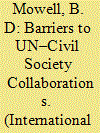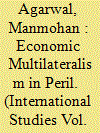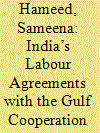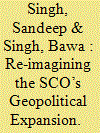|
|
|
Sort Order |
|
|
|
Items / Page
|
|
|
|
|
|
|
| Srl | Item |
| 1 |
ID:
183142


|
|
|
|
|
| Summary/Abstract |
In recent decades, civil society organizations (CSOs) have ostensibly attained increased access to the United Nations (UN) and other intergovernmental organizations (IGOs) and, in turn, increased opportunities for collaboration with IGOs. However, in most cases, CSO access to IGOs remains limited and highly regimented. Little scholarship has been undertaken to examine barriers to effective CSO–IGO collaborations. Virtually, no empirical research has examined the degree or nature of the interaction between the UN and international civil society via the dynamic of the flagship programme designed to facilitate such collaborations—the consultative status framework. This exploratory study partially addresses the latter gap in the scholarship by undertaking a qualitative macro-scale examination of CSOs within the UN Economic and Social Council’s (ECOSOC) consultative status programme, the primary vehicle in the UN–civil society dynamic. Specifically, the study sought to identify barriers to UN–civil society collaboration within the consultative status programme as perceived by participating CSOs. Findings of a survey sent to a random sample of 10% of CSOs holding UN–ECOSOC consultative status revealed that barriers to participation in the programme varied with some obstacles far more common than others. The degree of barriers reported by CSOs also strongly reflected the level of accreditation they held within the programme. Additionally, survey respondents offered insight as to how impediments in the collaboration could potentially be addressed.
|
|
|
|
|
|
|
|
|
|
|
|
|
|
|
|
| 2 |
ID:
183140


|
|
|
|
|
| Summary/Abstract |
The Doha Round of multilateral negotiations is at a stalemate. The aid situation is changing as many countries are graduating from the soft loan arm of the World Bank Group. Developing countries built up their foreign exchange reserves to avoid borrowing from the International Monetary Fund (IMF), leading the IMF to retrench. This article explores the evolution of multilateralism from, essentially, its political roots to the economic area after the First World War (FWW), though in a limited way, and more fully after the Second World War (SWW). We then discuss how the workings of these economic multilateral institutions resulted in the current situation, where they risk becoming irrelevant. Finally, the article discusses the possible role of theG20 in the revival of multilateralism and, in particular, the role that developing countries might play in the revival.
|
|
|
|
|
|
|
|
|
|
|
|
|
|
|
|
| 3 |
ID:
183141


|
|
|
|
|
| Summary/Abstract |
Despite the Indian government's proactive initiatives and reforms in the labour laws in the host countries, the welfare of Indian workers in the Gulf Cooperation Council (GCC) countries remains compromised. The Indian workers continue to face exploitation, often left stranded or forced to return home penniless. In line with best global practices, India’s Bilateral Labour Agreements (BLAs) and Memorandum of Understanding (MoUs) with all the GCC countries need to make specific reference to the host countries' labour laws and facilitate bilateral coordination in the governance of the full migration cycle. Special focus is needed in the construction sector, where a vast majority of low-skilled Indian workers are employed. The article examines the effectiveness of India’s BLAs and MoUs with the GCC countries in protecting the low-skilled Indian workers in the region.
|
|
|
|
|
|
|
|
|
|
|
|
|
|
|
|
| 4 |
ID:
183144


|
|
|
|
|
| Summary/Abstract |
Indo-Pacific has emerged as a region of great movement, conflict and cooperation, contestations and coalition-building. The emergence of minilateral and multilateral cooperation by the middle powers is increasing in the region, with the regional countries enthusiastically mapping the region focussing on their centrality. History proves that the role of middle-power countries became more prominent during the moments of international transition. The two contrasting powers like India and Australia; one with a post-colonial identity in foreign policy-making, subtle emphasis on non-aligned movement (NAM) and emerging as an influential power, and, on the other, a traditional middle power with an alliance structure and regionalism akin to the Western model, have equal stakes in the region and it is inevitable for them to take a leadership position in building what is called a middle power communion in the Indo-Pacific. This article will explore the understanding of middle powers and how India and Australia, as middle powers; are strategically placed and, being great powers within their respective regions; take the responsibility of region-building and maintaining peace with great powers, and how the Indo-Pacific and Quad are emerging as discourses within their foreign policy-making.
|
|
|
|
|
|
|
|
|
|
|
|
|
|
|
|
| 5 |
ID:
183143


|
|
|
|
|
| Summary/Abstract |
The SCO is one of the biggest geopolitical groupings in the world. It has provided a forum for its members, particularly, Russia and China, to cooperate on the set goals of the Eurasian re-integration. In contrast, SAARC cannot be termed as a successful organization, given the arch–rivalries between India and Pakistan. However, optimists believe that the geopolitical expansion, having India and Pakistan on board, the SCO would have the potential for economic and strategic cooperation. On the other hand, the evolving Sino-Pak axis vis-à-vis India has generated a view that China has offered an SCO platform to make its South Asia Policy a reality. Hence, an attempt has been made to assess the evolving speculations; will the geopolitical expansion of SCO unfold new opportunities or merely make SCO as another SAARC?
|
|
|
|
|
|
|
|
|
|
|
|
|
|
|
|
|
|
|
|
|